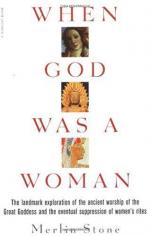|
This section contains 1,957 words (approx. 5 pages at 400 words per page) |

|
Chapter 5 Summary and Analysis
The ancient Hebrews cannot be considered in a religious, political, or cultural vacuum. The Indo-Europeans in Harran may have influenced Abraham, father of the tribes and first prophet of Yahweh. "Yahweh" may derive from the Sanskrit meaning "everflowing", and Abraham relates to the Indian Brahmins, whose patriarchal attitudes resemble the Hebrews. The Hebrews are not Indo-European, but neither are they totally Semitic from the start. By the time they settle in Canaan after Egypt they are mostly Semitic, but the priestly Levites may be related somehow to the Luvians. Note that the earliest extant texts of the Hebrew Scriptures are found at Qumran; the next earliest are a Greek translation. Otherwise, the "Jewish Canon" dates no earlier than the tenth century CE. The Yahwist texts are written ca. 1000 BCE and the Priestly sections ca. 600 BCE. Editing takes place over many centuries...
(read more from the Chapter 5 Summary)
|
This section contains 1,957 words (approx. 5 pages at 400 words per page) |

|




